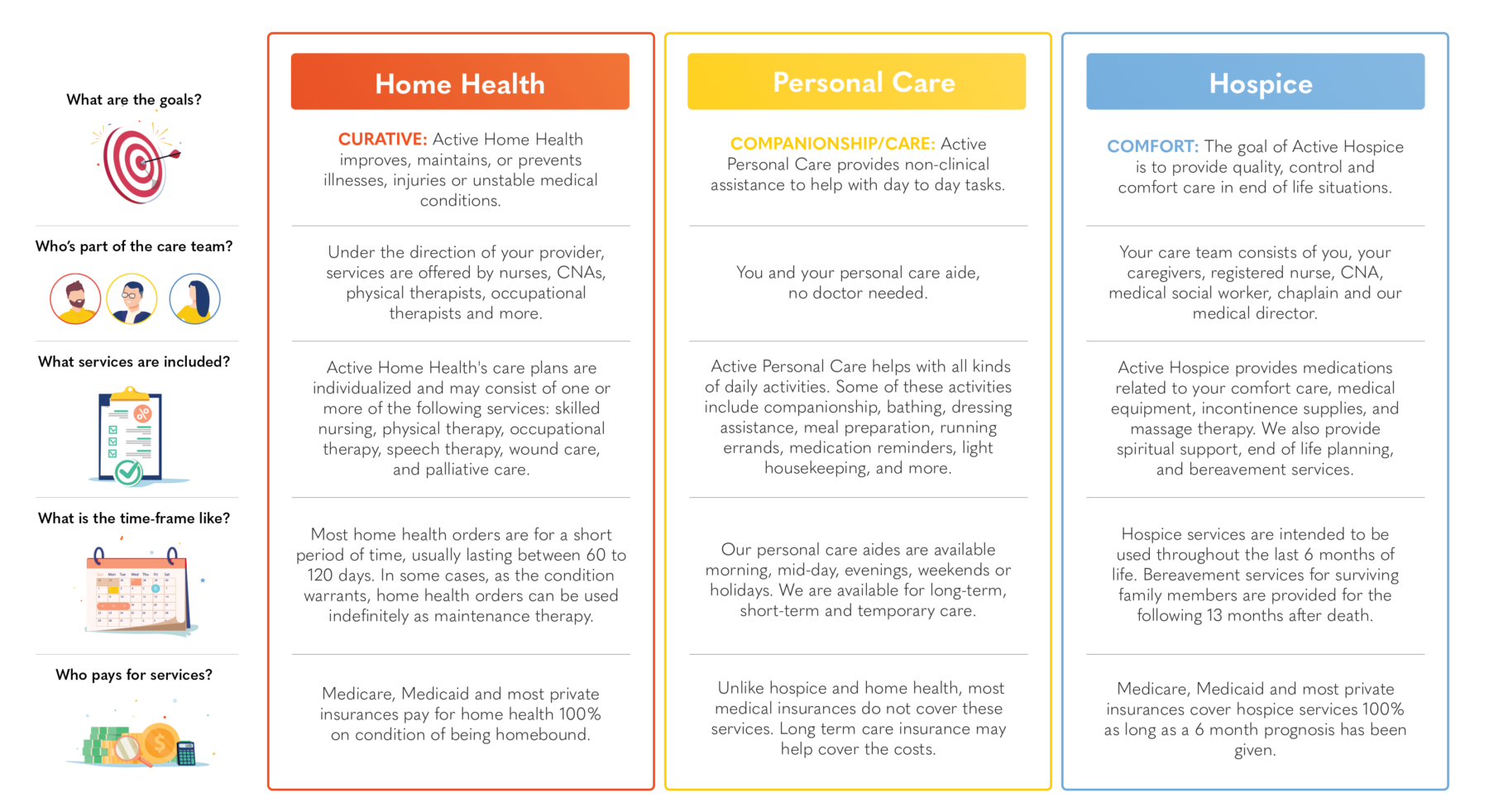
Understanding the differences between home health, hospice, and personal care empowers you to choose the right service for the right moments in life.
The terms “home health”, “hospice”, and “personal care” are often used interchangeably as potential solutions to helping those we love age in place. While these services all have the same goals of providing health care in the home and avoiding or reducing hospitalizations, they are not the same thing. Each is a specific home-based health service designed for specific moments in a person’s life. As such, there are several important differences that you should be aware of when deciding which one is best for you. To illustrate this, I want you to meet Arthur.
Arthur is an independent 99 year old who is very excited about his upcoming 100th birthday. He lives in an assisted living community where he spreads his love of life with an infectious smile and witty humor. Over the last two weeks, however, the staff and residents have noticed a significant decline in both his mobility and independence.
Upon visiting his doctor, Arthur and his family’s worst fears were confirmed: cancer. Due to his age and other comorbidities, he is not eligible for surgery or radiation and will need to proceed with chemotherapy only.
At first glance, Arthur’s story feels overwhelming and maybe even a little bit terrifying. But not for Arthur. Upon receiving the news, Arthur expressed his desire to move forward with chemotherapy. He hopes that the therapy will both provide comfort and help his reach her 100th birthday, now only months away. If you were in Arthur’s shoes, which service would you choose?
Arthur’s choice is not unique. Thousands of people in countless walks of life experience the same thing every day. Sometimes the diagnosis is unexpected like Arthur’s. For others, it is the culmination of years and years of fighting.
Regardless of the situation you may find yourself in, one thing is the same: Knowing the difference between home health, hospice, and personal care is essential to making sure you get the right service at the right time. Here at Active, we use what we call “The 3 C’s” to describe the different approaches to receiving care at home.
The First “C”: Curative
Home health is CURATIVE in nature. A person who chooses home health to provide service at home is looking to improve, maintain, or even prevent any number of illnesses, injuries, or unstable medical conditions.
These services are offered under the supervision of your medical provider. Our team of nurses, therapists, CNAs, and even medical social workers will work hand in hand with your doctor to restore you back to your active lifestyle. What might this look like? Perhaps you were an avid gardener before you fell and want to make sure you are ready to go for springtime planting. Maybe you want to be able to go out to the mailbox and back without becoming fatigued. It could be you have a wound that you want to have healed before your upcoming family reunion.
No matter what it is, we will work with you to both establish and complete your goals. Most home health episodes occur over a period of 60 to 120 days. But don’t worry; if the need continues, we won’t be going anywhere.
Medicare, Medicaid, and most private insurances pay for home health 100% on condition of being homebound (This doesn’t mean being bedbound or not ever being able to leave home).
The Second “C”: Comfort
There are times when curative measures are realistic, feasible, or even desirable. It can become burdensome trying to manage side effects or go from appointment to appointment. This is where the second “C” comes in. A person who chooses hospice focuses on the COMFORT that can come in end of life situations instead of pursuing curative measures. Hospice focuses on avoiding a prolonged dying experience, helping patients and their loved ones attain a better sense of closure and understanding.
This comfort is provided by a whole team of experts, led by our Medical Director, Dr. Rachel Stubbs, and her almost 20 years of experience providing hospice care. In addition, you will have 24/7 access to registered nurses, CNAs, chaplains, medical social workers, massage therapists and more. We provide medications related to your comfort care, medical equipment, and incontinence supplies. We also provide spiritual support, end of life planning, and bereavement services for your loved ones after you pass.
To qualify for hospice, a person must be given a 6-month prognosis. But that initial prognosis doesn’t put a limit on how long they can use hospice. While current guidelines help, they are not an exact science. If a person outlives that 6-month prognosis, they can continue to utilize their hospice benefits, as long as their physician recertifies that they still meet the criteria.
Just like home health services, Medicare, Medicaid, and most private insurances pay for hospice services 100%. So, for most people, hospice alleviates one more worry as they prepare for life’s final journey.
The Third “C”: Companionship and Care
The last “C”, COMPANIONSHIP AND CARE, refers to the type of services that are provided by our personal care aides. Also known as homecare, personal care provides non-clinical help with day to day tasks. Services start or stop whenever you want and do not require a doctor’s order.
Personal care helps you with all kinds of daily activities. These activities include companionship, bathing, dressing assistance, meal preparation, running errands, medication reminders, light housekeeping and more. Our personal care aides are available morning, midday, evenings, weekends, or holidays. We are available for long-term, short-term, and temporary care.
Unlike home health and hospice, most medical insurances, including Medicare, do not cover these services. While not required, we often recommend using personal care in conjunction with either home health or hospice. This helps fill in the gaps in care that aren’t covered by either of those two.
Which Service is Right for Me?
Remember Arthur? His story perfectly describes when to use each of these home-based health services. Arthur has already expressed a desire to start treatment with the goal of making it to his 100th birthday. Now is the perfect time to start with home health.
What would home health possibly look like for him? Our nurses would work with him and his doctor to manage the side effects of his chemotherapy. Our therapists could develop a home exercise program to keep him as active as possible. They could even help with adaptive equipment, such as a cane or walker, depending on how weak the chemotherapy makes him. Our CNAs could provide home cares and assistance one to two times a week.
As the disease progresses, Arthur’s goals and perspectives may change. What does he want to happen if chemotherapy becomes too difficult to continue? What about once he reaches his 100th birthday? Transitioning cares from home health to hospice may become a valid option. As it does, our nurses and medical director will begin to manage his pain and comfort levels. Our nurses will visit a couple of times a week, making adjustments as often as Arthur needs. He will receive any medical equipment, like hospital beds and wheelchairs, relative to his comfort needs. Both he and his family will receive visits from our chaplains and social workers to ensure all of their end of life needs and concerns are met. After Arthur passes away peacefully, those visits will continue, however often his family deems necessary, to help deal with the grief and pain of Arthur’s passing.
Arthur utilized personal care throughout his final journey. Our personal care aides helped Arthur get ready several days of the week. They provided companionship to him on the days after he received his chemo and even helped him with meals. After he transitioned to hospice, they continued to provide companionship and cares, helping him visit with his kids and grandkids each week before he passed.
Making the Right Decision
These decisions are not static; they ebb and flow as situations change. As such, it is vitally important to understand the differences between home health, hospice, and personal care. Doing so empowers you to choose the right care at the right moments in life. Unlike most companies in Utah, Active Home Health, Hospice & Personal Care can provide any of these three home-based care services you qualify for. To learn more, visit our Frequently Asked Questions or give us a call. We are always available to answer any questions you may have. We can even schedule a free, in-home assessment of your needs with one of our many service coordinators to help determine which service may be right for you or your loved ones.




